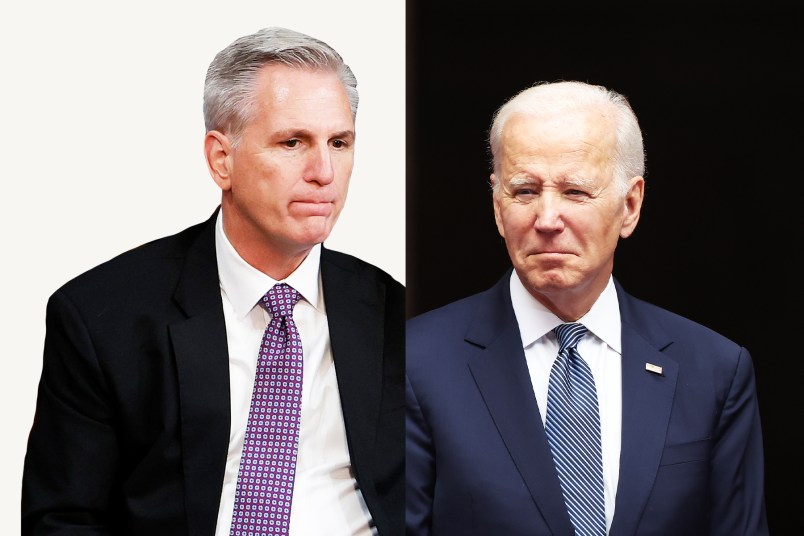We’re now bearing down on crunch time in the debt-ceiling hostage-taking drama of 2023. Virtually all of the establishment press is playing to form and treating the situation as a more or less ordinary matter of legislative jockeying and negotiation. That’s a problem but not a surprise. We’ll discuss that in another post. But this morning I want to talk about something different, the story that most commentators aren’t grasping about where this situation is headed. It’s a set of assumptions that is leading most of D.C. — and, it would appear, most of Wall Street — to miss what’s coming.
Most observers think that the White House’s stance not to negotiate over the debt is fundamentally a negotiating position, a stance aimed at driving political gains from highlighting both unpopular Republican demands but also general disorganization and antics from their most extreme members. Once that’s done they’ll be forced to come to the table and negotiate a way out of the impasse, the logic goes. In other words, the situation is fundamentally the same as what happened in 2011.
Certainly, Republicans see it that way. They took a clear lesson from 2011. They threatened the unthinkable and forced Barack Obama to accede to their demands, agreeing to major budget cuts that played out over the remainder of his term. They have the confidence of knowing that they are very willing to shoot their hostage if their demands or a major part of them aren’t met. (Indeed, a part of their caucus is eager to shoot their hostage for reasons that mix individual personality disorders and group ideology.) That confidence in their willingness to shoot their hostage is shared, rightly, across the political spectrum and by the less overtly political stakeholders observing the drama unfold. It shapes everyone’s understanding of what’s happening: Republicans are willing to do the unthinkable; and since the unthinkable can’t happen, it’s up to the Democratic President to save the country from it.
The problem with all these assumptions is that it fails to take into account the internal politics of the Democratic Party over the last dozen years. One of the central takeaways from the Obama years not only for lots of Dem political junkies but perhaps more importantly for the Democratic political class is that Barack Obama’s decision to negotiate was a categorical and grave error and that can’t ever be repeated. The people who learned that lesson from the inside now basically run the Biden administration. Many have comparable positions; others at the highest level were a rung or two lower 12 years ago. Joe Biden is known as being one of those people who interpreted the lessons of that drama in the same way even though, or perhaps because, he played a key role in negotiating the outcome. In other words, it’s the same GOP, but it’s not the same Democratic Party. We are likely to hit the crisis with neither side willing to give way.
For what it’s worth, I agree with that lesson. It was the right lesson to learn. You simply cannot have a functioning government in which one party threatens to break the state whenever it gains even a foothold of power in one chamber of Congress. It’s the standard lesson: you can’t negotiate with terrorists. It only encourages more terrorism. But my aim here isn’t to argue that point. It’s not what should happen. It’s what has happened. And without knowing that, observers have a far rosier idea of how it plays out.
Now, old lessons are hard to unlearn. The GOP is a radical, revanchist party. Its modern incarnation is fundamentally different from the Democratic Party, which has a far harder time threatening to break things or refusing to backstop Republican parliamentary terrorism.
One of Democrats great challenges is that even though Joe Biden learned this lesson like so many others he is characterologically resistant to the kinds of extraordinary measures that will likely be required as a result of the “no negotiations” position he’s staked out. So maybe a month from now we’ll hear that Joe Biden has decided he’s going to negotiate after all or perhaps agree to concessions not labeled as negotiations. But I tend to doubt it. If he did he’d trigger a conflagration among Democrats. That fact itself would make any resolution far more complicated, messy and dangerous than anything that happened in 2011.
Joe Biden can’t operate without support from his own party and fundamentally he’s a median Democrat. He’ll always be where the center of gravity of the Democratic Party happens to be. Missing that reality is why so many were surprised at how he’s governed. If Biden’s “no negotiations” position is real, he needs a response to Republican willingness to kill their hostage. It’s not clear what that is. And if he has one he needs to keep it under wraps until the final moment, adding a huge amount of danger and drama to what unfolds.
We can’t know all the details of how this plays out. But we can understand that the conventional wisdom is ignorant of one of the central drivers of the outcome, which is the fact that a refusal to ever negotiate again in just such a situation is one of the cardinal takeaways from the last 20 years for a generation of Democrats. That’s also why actual debt default or the administration resorting to one of several extraordinary actions to unilaterally operate above the debt ceiling is the most likely outcome of this drama.






